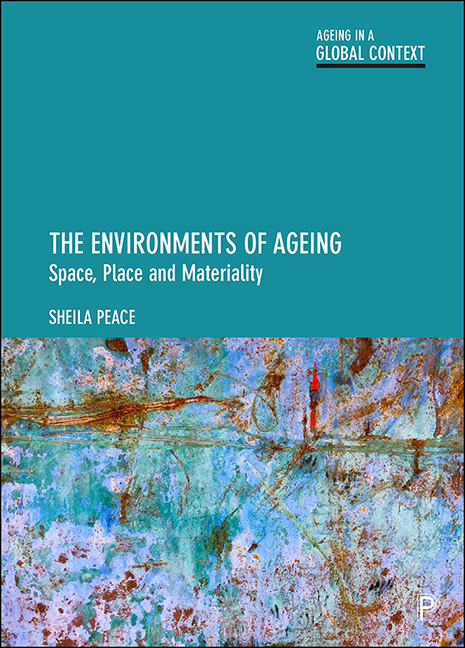Book contents
- Frontmatter
- Dedication
- Contents
- List of figures and tables
- Research summaries
- List of acronyms
- About the author
- Acknowledgements
- Series editors’ preface
- Preface: understanding the structure
- 1 Person and environment
- 2 Theoretical development
- 3 The global context
- 4 Environmental living
- 5 Housing in later life
- 6 Housing histories, housing options
- 7 Alternative environments: specialised housing (with care)
- 8 Care home living: a form of long-term care
- 9 Methodological development
- 10 Rethinking the spatiality of ageing
- Glossary of terms
- References
- Index
Preface: understanding the structure
Published online by Cambridge University Press: 15 September 2022
- Frontmatter
- Dedication
- Contents
- List of figures and tables
- Research summaries
- List of acronyms
- About the author
- Acknowledgements
- Series editors’ preface
- Preface: understanding the structure
- 1 Person and environment
- 2 Theoretical development
- 3 The global context
- 4 Environmental living
- 5 Housing in later life
- 6 Housing histories, housing options
- 7 Alternative environments: specialised housing (with care)
- 8 Care home living: a form of long-term care
- 9 Methodological development
- 10 Rethinking the spatiality of ageing
- Glossary of terms
- References
- Index
Summary
The 21st century has seen environmental gerontology recognised as a valued field within the multi-and interdisciplinary study of social gerontology. This domain evolved through the last century as researchers recognised the importance of person–environment interaction to understanding ageing and later life. Now it takes into account the complexity of human lives and the environments of the everyday, not only in the immediate and local but also within national and global contexts. Here, context includes the social, political, material, physical, psychological, economic and cultural elements of the society in which discussion is based. The motivation for this book comes from my desire as a white British woman in her late 60s to make a lasting contribution to this field, drawing on more than 40 years of research experience that embraces international scholarship. The aim is to discuss the environments of ageing through the relationships between milieu, behaviour and well-being, and while I focus on the second half of life, the value of life course experience and historical perspectives is recognised as fundamental.
Although I am a human/social geographer by first discipline, my academic work in gerontology commenced before the emergence of geographical gerontology (see Peace, 1977, 2018; Warnes, 1981; Harper and Laws, 1995; Andrews et al, 2007, 2009; Skinner et al, 2018), and I value the intellectual challenge of working with colleagues across the social, human and design/engineering sciences (Peace, 2018). Even so, unsurprisingly when considering environment and ageing, I embed the ‘spatial turn’ in this text by referring to three levels of spatial scale – pictured in Figure 0.1 – macro- (global), meso- (national) and micro- (local), which I see as essential to discussion within environmental gerontology. This is a project that began some years ago, and during that time I have realised that while my own research addresses important issues at micro-and meso-levels, the fundamental importance of macro-concerns are central. These diverse spatial environments enable attention to be drawn to issues that span the global to local and local to global context.
Across this text, I draw upon a diverse literature based primarily in England and the UK, with international comparison given where appropriate. Across the ten interconnected chapters, I aim to assimilate knowledge, theory and method. The first three chapters provide the necessary foundation through which to consider different perspectives regarding the person–environment relationship in later life.
- Type
- Chapter
- Information
- The Environments of AgeingSpace, Place and Materiality, pp. xv - xviiiPublisher: Bristol University PressPrint publication year: 2022



